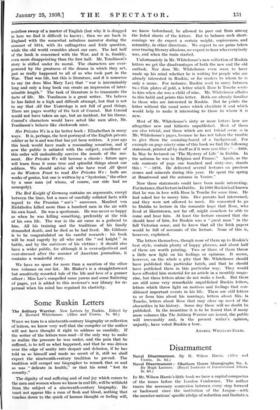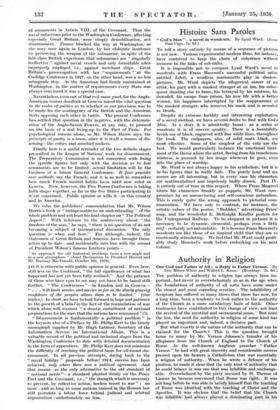Disarmament
IN Mr. Wilson Harris's little book we have a capital conspectus of the issues before the London Conference. The author traces the necessary connexion between every step forward or backward since - the institution of the League—with the member-nations' specific pledge of reduction and limitation
of armaments in Article VIII.. of the Covenant. Thus the naval reductions prior to the Washington Conference, affecting especially Great Britain, were simply demobilization, not disarmament. France blocked the way. at Washington, as she may once again in London, by her obdurate insistence on preserving the weapon of the submarine, in spite of the first-class British experience that submarines are " singularly ineffective ". against naval vessels and only formidable when improperly employed, i.e., against merchant ships. Great Britain's preoccupation with her " requirements " at the Coolidge Conference in 1927, on the other hand, was a no less retrograde step. As the American had firmly maintained at Washington, in the matter of requirements every State was always convinced it was a special case.
Nevertheless, even out of that evil came good, for the Anglo- American cruiser deadlock at Geneva raised the vital question in the realm of politics as to whether or not provision was to be made for the contingency of the British and the American fleets opposing each other in battle. The present Conference has settled that question in the negative, with the determin- ation of the Anglo-Saxon Powers, at any rate, to proceed on the basis of a real living-up to the Pact of Paris. For psychological reasons alone, as Mr. Wilson Harris says, the principle of parity is a boon, since it is itself a means of dis- arming—the critics and mischief makers.
Finally here is a useful reminder of the two definite stages prescribed in the League of Nations' work for disarmament. The Preparatory Commission is not concerned with fixing the specific figures but only with the decision as to how armaments are to be limited ; actual limitation will be the business of a future General Conference. .11 fact prodder avec mithode, say the French, and it is as well to remember how much French mental habits have until now ruled at Geneva. Now, however, the Five Power Conference is taking both stages together, so far as the five States participating in it are concerned. Public opinion so wills it—in this country and in America.
We echo the publishers' commendation that Mr. Wilson Harris's book is " indispensable to an understanding " of the whole problem and not least his final chapter on " The Political Aspect." With reference to the controversy about " the freedom of the seas," he says, " there is no question of its not becoming a subject of international discussion. The only question is when and . how." For although, indeed, the statesmen of Great Britain and America have brought them- selves up to date—and incidentally into line with the second of President Wilson's famous fourteen points— "we approach the old historical problems from a new angle and in a new atmosphere " (Joint Declaration by President Hoover and Mr. Ramsay MacDonald, October 9th, 1929).
yet it is otherwise with public opinion in general. Even here, still less on the Continent, " the full significance of what has happened has not yet been fully realized." And the patience of those who have eyes to see may yet have to be taxed still further. " The Conferences "—in London and in Geneva- " . . . will limit armies and navies so far as the slowly growing confidence of the peoples allows them to be limited." (Our italics.) In short, we have to look forward in hope and patience to the growth of a belief in the fact of the renunciation of war which alone will warrant " a drastic curtailment of national preparations for the wars that the nations have renounced " (!). " " Disarmament is-fundamentally a political problem" is the keynote also-of a Preface by Mr. Philip Kerr to the timely monograph supplied by Mr. Hugh Latimer,: Secretary of tfie Information Service on International Affairs. This is a valuable record of the political and technical stages from the Washington Conference to date with detailed documentation in the form of appendices. Mr. Philip Kerr does not minimize the difficulty of reaching the political basis for all-round dis- armament. 'In all previous attempts, dating back to the " naval holiday " proposals before', 1914, success has been achieved, only where there was a political agreement. And that means—as the only alternative to the old standard Of " national needs "—a standard planted firmly on the PeaCe Pact and the Covenant, i.e., " the strength which is necessary to prevent, by collective action, lawless resort to war " ; no more—and so long as some nations trained in the Roman law still postulate a latent force behind judicial and arbitral organization7.-unfortunately no less._ _







































 Previous page
Previous page